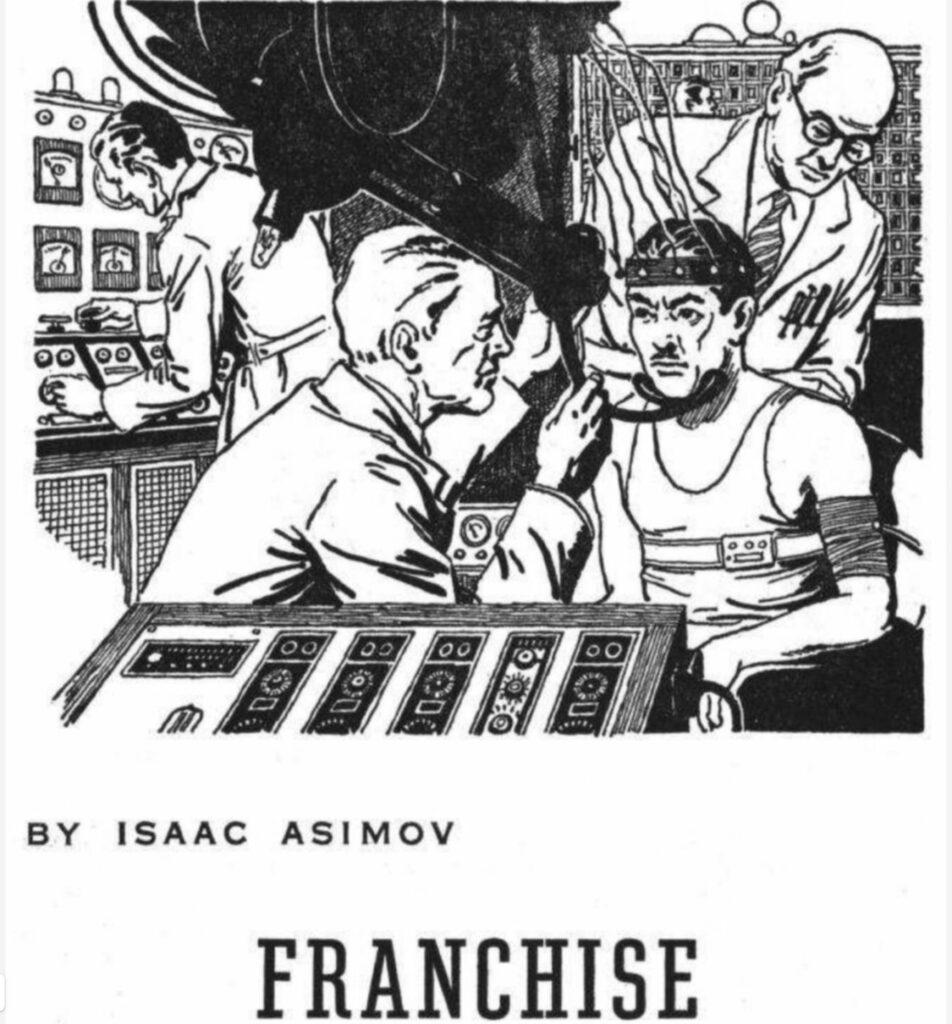It all began with the election of 1952, when a UNIVAC computer correctly predicted the outcome of the presidential election.
Now if you look at the election results from that year, it seems like it would have been a no-brainer to predict. After all, Dwight Eisenhower beat Adlai Stevenson by over 6 million votes, and wiped the electoral map with him by winning 442-89.
However, according to all of the pre-election polls, expectations ranged from a Stevenson landslide to a narrow victory over Eisenhower – virtually none of the pundits and pollsters thought Eisenhower had much of a chance of winning.
This was also a time when people were getting used to the immediacy of first radio and then TV, and they wanted results as quickly as possible. Consequently, Remington Rand (now Unisys) approached CBS News and convinced them it would be interesting to use one of the 8-ton walk-in UNIVAC computers (it was as big as a two-car garage) to predict the election results from early returns.
Mathematicians John Mauchly and Max Woodbury were enlisted to write a program for the thousands of vacuum tubes in the system to utilize. It would compare early results to data compiled from the previous election and attempt to extrapolate the winner. UNIVAC at the time could perform about 10,000 calculation a second. Today’s supercomputers can do quadtrillions (a quadtrillion is 1000 trillions or a million billions – 1 followed by 15 zeroes) calculations per second.
A teletype was connected between the UNIVAC in Philadelphia and CBS studios in New York for election night. As precincts reported early results, and technicians used Unityper machines to encode the data on paper tapes which were then fed into UNIVAC via the teletype.
Just a half an hour after the first polls closed, much to the surprise of CBS and contrary to the poll results, UNIVAC was predicting Eisenhower would win with 438 electoral votes to 93. It further insisted that the odds of Eisenhower getting at least 266 votes (the threshold for winning at the time – fewer states in 1952) were a shocking 100 to 1!
The president of CBS and Walter Cronkite were skeptical to say the least. They decided not to announce the results on the air, even as UNIVAC’s prediction stayed consistent as more data was added.
Finally, late at night, it was obvious that an Eisenhower landslide was gaining momentum. The final actual count of 442-89 was only 1% off of UNIVAC’s prediction. CBS rather sheepishly confessed on air that they had an accurate prediction hours earlier, and had failed to announce it.
That was that. For the 1956 election and on, everyone was using computers to predict results from early returns, and the race was on.
In 1955, American author Isaac Asimov, no doubt inspired by these events, wrote a short story for the August issue of the magazine If: Worlds of Science Fiction. It was a cautionary tale entitled “Franchise”.

In Asimov’s story, things in the future had proceeded to the logical extreme. Computers became more powerful, and the demand for faster results more insatiable. Asimov envisioned “Multivac” (what else would be better than a Uni-vac?), a huge supercomputer “half a mile long and three stories high”, with an army of technicians tending to its needs and feeding it data from all over the world. It would star in several of his stories as an all-powerful oracle.
Such was its computational power that in the far-future election year of 2008, a streamlined version of the election process with almost immediate results was possible.
Multivac selects just one US citizen as the perfect average specimen, in this case a rather reluctant Norman Muller of Bloomington, Indiana. Mr. Muller is whisked away to a secure location on Election Day, where he is hooked up to a series of bio-monitors to measure his heart rate, breathing, brain waves and more so that Multivac can also measure the intensity of his feelings as he answers a series of questions.

These questions may be about his local garbage collection, how he feels about schools, whether he uses a doctor or National Medicine and so on. He is told he can answer in as much detail as he likes, and to take as long as he needs. Technicians will encode his answers on paper tape and feed it to Multivac. After hours of interrogation, all he can really remember clearly is one question that struck him as rather gossipy – “What do you think about the price of eggs?” His reply – “I don’t know the price of eggs.”
From this input, Multivac then goes on to decide the outcome of not only the National Election, but all state, county, and local offices and referendums. No one else has to cast a vote, and the results are tabulated within an hour or so and ready for public announcement. The story ends with the pronouncement, “In this imperfect world, the sovereign citizens of the first and greatest Electronic Democracy had, through Norman Muller exercised once again its free, untrammeled franchise.”
I thought about this story as I was standing in line to vote yesterday. Our state offers ten days of early voting, and there are eight different locations in our county where we can vote. We ended up waiting about an hour to vote, and I’ve heard the other facilities were also running between 1-3 hours. Compared to what voters are facing in some states, this was pretty good. Consider also the many states without early voting, where millions of people will try to exercise their “untrammeled franchise” over a 12-hour or less span.
In these Days of Covid, it is even more important to get your voice heard. Don’t listen to people who tell you it is pointless, the results are rigged, and your vote won’t make any difference at all. It will make a difference where it counts – in your heart.
Voting is a time that I feel especially patriotic. Yes I know I am only one vote, and that with the electoral system my deep red state is only going one way regardless of which way I vote, but I still feel a thrill at adding my lone voice to the chorus.
This year I felt even more proud using my franchise. Although Tennessee has mail-in and absentee voting, the Governor and state legislature pushed through a ruling that wanting to avoid crowds during the pandemic was not a sufficient reason to vote by mail. A desire to reduce the number of people poll workers have to be exposed to is also not a valid reason. If you are disabled, out of state, or currently quarantined or in the hospital with the coronavirus you can vote by mail – otherwise you can only vote in person.
So it was very encouraging to see on the first day of early voting a steady line of a hundred or more waiting patiently to cast their votes. Most of the line was outside on a beautiful clear autumn day. Everyone was maintaining social distance, and we only saw one person carrying his mask instead of wearing it, loudly proclaiming that because he drinks slightly acidic water and takes zinc and Vitamin D he was immune.
He was required to put it on to enter the building, and the poll workers were all masked and behind plastic shields. You were encouraged to bring your own pen, but there were some available on the way in that could be dropped in a basket for disinfecting and re-use on the way out.
Yet despite the masks and precautions, the mood of those in line (except Mr. Acidic) and in the polling place itself was surprisingly upbeat and positive. There was a palpable sense of pride, a feeling that I am going to vote. No. Matter. What.
Especially poignant to me was something that happened while I was verifying my ID (Rita and I each brought our Voter ID card, Drivers Licence, and passport – we weren’t taking any chances). The poll workers in the next booth called out “Hey everybody, we’ve got a first time voter here!”.
The whole place broke out in spontaneous applause and cheers, and I must admit I got goosebumps and a lump in my throat myself. I looked over at the young man, and despite the mask you could see his eyes light up and the beaming smile as he proudly walked over to get his ballot.
This by the way is something else I was happy to see. We were kicking it Old School. After presenting our ID authorization, a fresh paper ballot was printed out, and we voted by filling in the box beside our candidates names. When the ballot was completed, we were able to feed it directly into the scanners ourselves, and wait to confirm that it was able to read all of the data. This means results will be available on election day immediately, and there is a paper trail if verification is needed.
This pride in voting seems to be particularly infectious (sorry about the word) this year. As you see posts in social media and videos on YouTube, there’s a sense that waiting in line is a badge of honor. People seem to be proud to wait all day to vote, rather than complaining. Volunteers are bringing food and water, chairs for the elderly, and offering to hold spots in line for those in need of bathroom breaks.
Now more than ever, I think it is important for as much of the electorate as possible to make their vote count. Rather than one Norman Muller we need as many franchise holders as we can making their voices heard. And we need to understand that Multivac isn’t going to spit the results out to us within hours of the polls closing. We have to be diligent in exercising our right to vote, and patient as we wait for ALL of the votes to be counted. Remember that your fellow citizen’s vote is just as important as your vote.
I really don’t care who you vote for. But I do think it is vital that enough Americans vote that there can be no question about the outcome, and let the chips fall where they may. By all means take all precautions that you feel are necessary for your health and the health of those around you, and if early voting or mail-in is available, do take advantage of it so November 3rd goes as smoothly as possible.
But don’t let any Norman Muller make your choices for you.


Leave a Reply